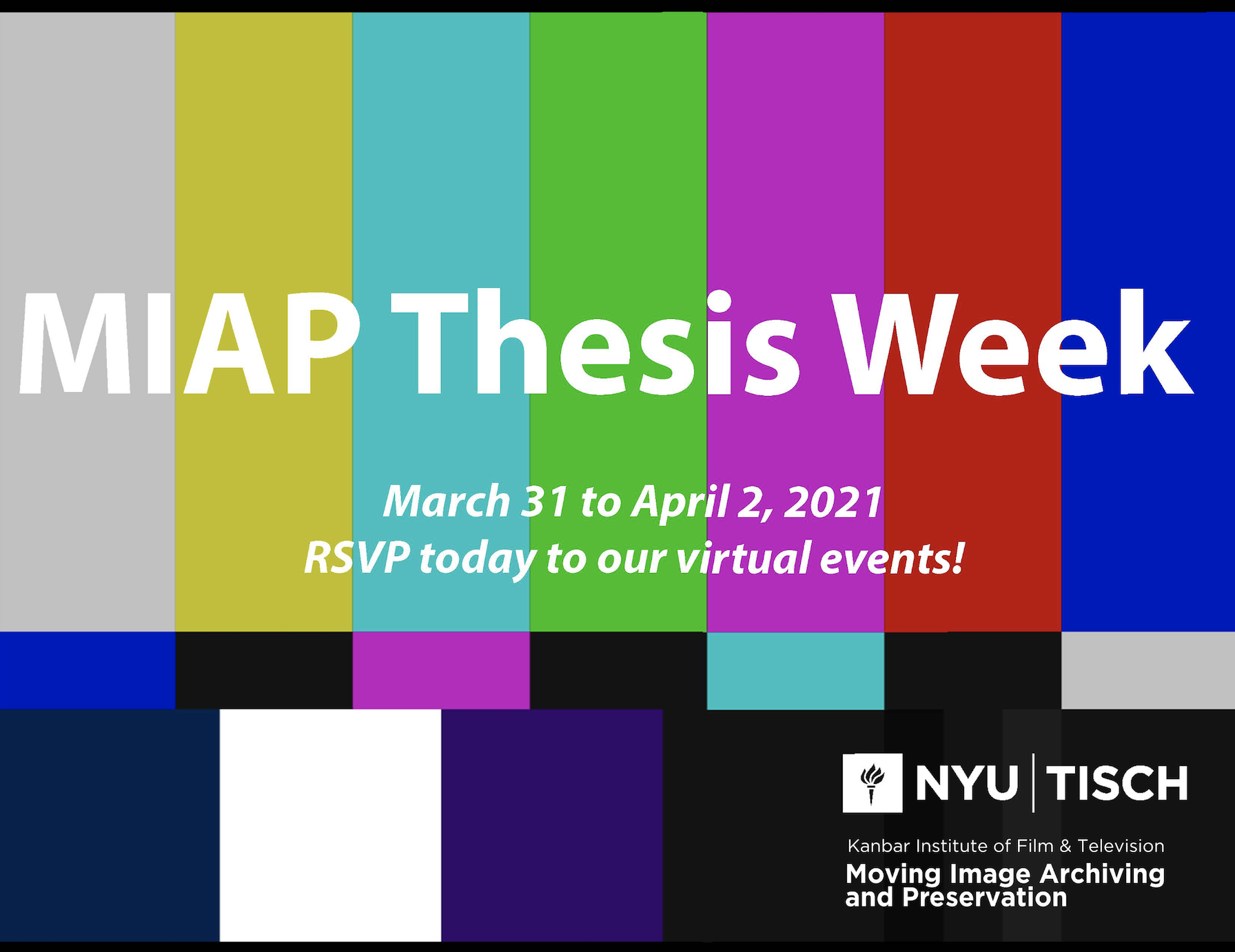2021 MIAP Thesis Week

Students in the Moving Image Archiving and Preservation (MIAP) program will present their M.A. thesis projects. This year, students will share insightful overviews of ongoing research in culture cancelation, media archeology and media preservation, new debates in storage practices, international administrative frames, as well as collection and equipment preservation projects. See below for a complete schedule and presentation descriptions.
Registration is now closed. If you have already registered, links to join each individual Zoom meeting will be sent from tisch.preservation@nyu.edu the morning of each event. Please check your spam folders if you haven't received an invitation including these links at least one hour prior to the session. If you have any problems, please email tisch.preservation@nyu.edu.
Wednesday, March 31
10:30 AM - 11:30 AM EST
Klavier Wang - Mind Your Disc - Retrieving and archiving audio information stored in MiniDisc
MiniDisc, a born-digital optical disc based media, becomes obsolete in 2011. After the heyday in the early 2000s when MiniDisc was widely used by cultural institutions, its obsolescence and highly proprietary nature now causes headaches to archivists. This thesis is a technical investigation into this media format and it provides to the community documentations and instructions of different approaches to retrieve and archive audio information stored in MiniDiscs.
12:00 PM - 1:00 PM EST
Madeleine Mendell - DNA in the Archive: Material and Metaphor of a New Data Storage Format
As DNA becomes a viable solution for offline data storage, memory institutions must confront the implications this new format will have on our relationships to the living world, to ourselves, and to our data. This thesis explores the technical specifications of DNA and the advances required for DNA to become an appropriate preservation format as well as other factors contributing to its appeal in the near future. This thesis also grapples with the ways in which DNA’s perpetuation as ‘the code of life’ in the public imaginary affects our preservation strategies and reveals underlying ideologies of the archive.
2:00 PM - 3:00 PM EST - Asynchronous Presentation
Shiyang Jiang - History, Technology, and Preservation of the AM&B Mutoscope Reels
This thesis will investigate the technology and history of the Mutoscope reels of American Mutoscope and Biograph Company productions to answer the question of what historical, archival, and aesthetic significance they hold. I will also briefly survey the latest development and trends in the field of film and flipbook preservation to address the question of how to preserve and represent Mutoscope reels faithfully. A major Mutoscope collection, Douglass Crockwell Collection at George Eastman Museum, will be used as a case study to discuss these questions.
Thursday, April 1
10:30 AM - 11:30 AM EST - Asynchronous Presentation
David I. Griess - A DIY Approach: Creating Access to Home Movie Excerpts Documenting the Art & Life of Kent Bellows
This project outlines the challenges of archiving and preserving a collection that spans over seven decades (1940-2013). These recordings document a Midwestern family whose members support one another while openly encouraging and nurturing creative expression. Simultaneously, the footage reveals candid audiovisual portraits of Omaha, Nebraska artist Kent Bellows (1949-2005) and his relationship to art and life.
12:00 PM - 1:00 PM EST - CANCELLED
Aparna Subramanian - Film Archiving in India: Leadership and Policy
Historiographic study and analysis of management of the film archive in India to investigate the evolution of the institution and understand its limitations. (Due to unforseen circumstances, this presentation has been cancelled.)
2:00 PM - 3:00 PM EST - RESCHEDULED
Ryan B. Lakin - Racist Commercial Films and the Ethics of Access
This research project will examine potential issues arising from creators restricting access to racist commercial films in response to Black Lives Matter and other racial justice movements, arguing that such actions have historically allowed creators to sanitize their legacies by removing evidence of their racism from cultural memory, while retaining their ability to profit off those works. I will explore potential alternatives to removing these films from distribution which foster a sense of cultural accountability and meaningful engagement with the sensitive nature of the content. A major consideration of this research will be growing advocacy for pressuring creators to relinquish their ownership of racist works, and the potential effects of having these works in the public domain, both on cultural heritage institutions and users. (Due to unforseen circumstances, this presentation has been rescheduled. More information to follow.)
Friday, April 2
9:30 AM - 10:30 AM EST - Asynchronous Presentation
Zoe Yang - Project Runway: Preserving the FIT Audiovisual Collection
This thesis preservation project focuses on streamlining the video and digital preservation process of the Special Collections and College Archives (SPARC) audiovisual collection at the Fashion Institute of Technology (FIT). The objective of this project is to assist FIT in establishing plans to standardize, preserve, and provide wider access to the collection assets.
11:00 AM - 12:00 PM EST
Robert Hoffman - Reel Trouble: An Investigation Into the Refurbishment of Obsolete Video Equipment
Discussion of magnetic time-based media preservation often focuses on the best practices regarding conservation and digitization/migration of physical media, reels, cassettes, and optical discs. What about the equipment used to play them back? This thesis seeks to explore the challenges of working on one of these old machines, an Ampex VPR-2B 1inch open-reel videotape recorder, and the attempt to revive it from barn-find to playing a ape.